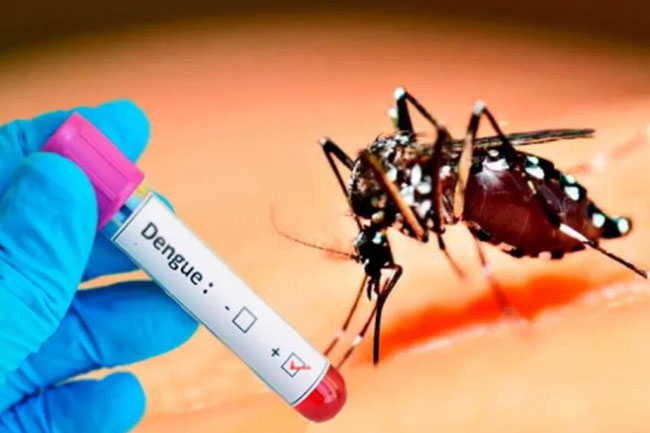Health officials emphasize need for additional measures to combat spread of dengue
Director of the National Dengue Control Unit Dr. Sudath Samaraweera, emphasized that dengue disease extends beyond mere health implications, presenting significant economic and social challenges. He underscored that the Ministry of Health alone cannot effectively control the spread of dengue and requires full public support.
Dr. Sudath Samaraweera, disclosed that within the last five months of this year, over 25,000 dengue cases and nine dengue-related deaths have been reported.
Director of the National Dengue Control Unit Dr. Sudath Samaraweera, a specialist, made this revelation while participating in a special news conference held at the Presidential Media Centre on June 06.
He also emphasized the critical importance of effectively managing the spread of the disease, noting that the current flood situation could potentially escalate the dengue outbreak to an epidemic level.
Dr. Sudath Samaraweera, further commented,
Dengue is a preventable disease that can affect individuals of any age or socioeconomic status. While many individuals recover from dengue, it also poses a risk of mortality. This inherent risk underscores the importance of ongoing public education initiatives focused on dengue prevention. Particularly during the monsoon season, it is imperative to raise awareness about dengue and its prevention.
In light of the epidemic situation observed towards the end of 2023, the number of reported cases surged to over 10,000 in January 2024. However, this figure gradually declined, with only 2234 cases reported by April. Nonetheless, the number of reported cases increased to 2647 in May. The recent floods may exacerbate the breeding of dengue mosquitoes, potentially leading to a further increase in dengue cases in the future.
Dengue transcends being solely a health concern; it extends into economic and social realms. Consequently, effective dengue control cannot be achieved by the Ministry of Health alone; it necessitates the full support of the public. Preventing dengue requires a collaborative effort involving all government departments, the private sector, and the entire population.
Chairman of the National Drug Regulatory Authority and a specialist at the National Institute of Infectious Diseases, Dr. Ananda Wijewickrama, advises that during this period, individuals experiencing symptoms such as high fever, abdominal pain, vomiting, severe headache, and diarrhoea should consider the possibility of having contracted dengue disease.
In such cases, it is crucial to prioritize physical rest. As previously mentioned, it is advisable to refrain from taking painkillers or other medications, except for ‘paracetamol’, as using other medications may lead to serious complications. If symptoms persist for more than two days, it is recommended to undergo a Full Blood Count (FBC) and seek medical advice from a government hospital. Hospitalization will be determined based on the severity of symptoms and medical assessment.
During this time, it is essential to ensure adequate hydration by consuming water and liquids such as porridge, ‘Jeevani’, orange and lime. It is crucial to avoid liquids that are red in colour or contain artificial chemicals. Following medical advice is imperative for managing dengue disease and mitigating its severity. It is important to note that the reduction of fever does not signify the cure of dengue.
Individuals who are particularly vulnerable to complications, including young children, diabetics, pregnant mothers, elderly individuals, and obese patients, should seek medical advice promptly.
Community Medical Officer at the National Dengue Control Unit, Dr. Anoja Dheerasinghe reports that in the year 2024, Sri Lanka recorded a total of 25,417 dengue cases. Particularly in the districts of Colombo, Gampaha, Kalutara, Ratnapura, Kandy, Kegalle, and Kurunegala, there has been a notable increase in reported cases.
To prevent dengue transmission, the most fundamental measure is to eliminate mosquito breeding sites at home, school, or workplace. Additionally, individuals experiencing fever should promptly seek medical attention from the nearest hospital or qualified doctor within two days and follow their advice. It is crucial to adhere to medical guidance and only take the medication ‘paracetamol’ to control fever.
Consultant Community Physician and Regional Epidemiologist at the Colombo Regional Health Services Directorate Buddhika Mahesh, underscores the critical importance of dengue control efforts in the Western Province, particularly in light of current rainfall patterns. He emphasizes the need for additional measures to combat the spread of dengue.
According to the mosquito’s life cycle, which takes seven days from the larvae stage to adulthood, regular cleaning of the environment once a week can effectively control the spread of dengue. Special attention should be given to areas around relief camps to ensure they are mosquito-free zones.
The local Medical Office of Health (MOH) offers complimentary medical advice for dengue and other infectious diseases. Despite fewer reported cases in the Western Province compared to previous years, continued public support is essential to further reduce dengue incidence. The Dengue Control Committee in the Western Province employs drone technology to identify mosquito larvae and administer insecticide spraying.
-PMD

